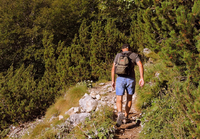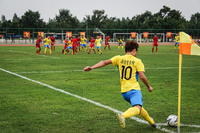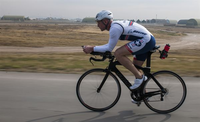Exercise
Key Stage 1
Meaning
Exercise is any movement that needs a lot of effort.
About Exercise
- We must exercise to stay healthy.
- Exercise can make us feel tired and sweat but it is very good for us.
- Without regular exercise doing simple things like walking and climbing the stairs can make you feel tired.
- With lots of exercise you become stronger, healthier and feel less tired doing things.
Examples
| Swimming is great exercise for all of your muscles. | Taking long walks in the countryside is good exercise. |
| You can exercise by running. | Playing football is a great way to exercise. |
| Many people go cycling for exercise. | You can exercise by playing tennis. |
Key Stage 2
Meaning
Exercise is any movement that needs a lot of effort to keep us fit and healthy.
About Exercise
- Regular exercise is important to keep us healthy.
- Exercising makes our muscles stronger.
- Exercising makes your heart beat faster which makes the heart muscles stronger.
- The more exercise you do, the easier exercise becomes.
Exercise and Health
- Not enough exercise can make us unhealthy. It causes us to become weak and it increases the risk of heart attack.
- Exercise helps prevent us from getting overweight but research suggests that it doesn't make us lose weight. Only a better diet can cause you to lose weight.
Key Stage 3
Meaning
Exercise is any movement that needs a lot of effort and increases our heart rate and breathing rate.
About Exercise
- Exercise increase the rate of respiration in the muscles. This provides the muscles with the energy they need to move.
- Athletes have bigger lungs than average because regular aerobic exercise can increase the volume of the lungs. This allows them to take in more oxygen for respiration.
- Exercise strengthens the diaphragm and intercostal muscles allowing you to inhale and exhale more.
- Athletes have slower heart rates than average because regular aerobic exercise makes the heart muscles stronger so the heart doesn't need to beat as often. This allows the blood to be sent around the body more quickly providing the muscles with oxygen for respiration.
Key Stage 4
Meaning
Exercise is any repetative physical activity that causes our heart rate and breathing rate to increase and can cause muscles to grow.
About Exercise
- Exercise causes the rate of respiration to increase as the muscles need more energy to work.
- Exercise causes the breathing rate to increase in order to supply more Oxygen to the muscles and get rid of the extra Carbon Dioxide in the blood.
- Exercise causes the heart rate to increase to pump the blood, containing glucose and Oxygen around the body quicker to get to the muscles that need it.
- Repeated exercise causes the muscles of the heart to become stronger which allows the heart rate to be lower. A person with a low resting heart rate is able to pump blood more efficiently and can be described as more 'fit' than a person with a high resting heart rate.
- When muscles are not provided with enough Oxygen they go into Oxygen Debt and begin producing Lactic Acid which builds up in the muscles causing a stitch. Lactic Acid is toxic in large quantities so it is transported to the liver where it is removed from the blood and detoxified by turning it back into glucose.
Exercise and Disease
- Regular exercise can reduce the risk of a number of diseases including Coronary Heart Disease.
Beyond the Curriculum
References
AQA
- Exercise, page 132, GCSE Biology; Student Book, Collins, AQA
- Exercise, page 59, GCSE Combined Science Trilogy 1, Hodder, AQA
- Exercise, page 63, GCSE Biology; The Revision Guide, CGP, AQA
- Exercise, pages 118-119, 136-139, 141, GCSE Biology; Third Edition, Oxford University Press, AQA
- Exercise, pages 163, 164, GCSE Combined Science Trilogy; Biology, CGP, AQA
- Exercise, pages 177, 178, GCSE Biology, CGP, AQA
- Exercise, pages 59, 123-4, GCSE Biology, Hodder, AQA





